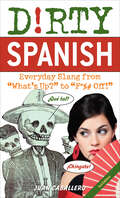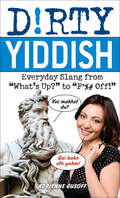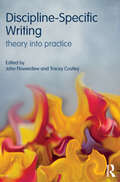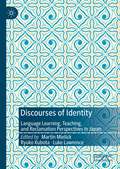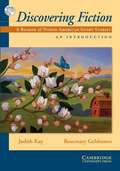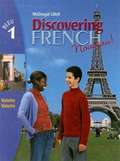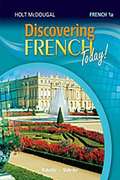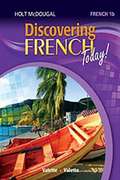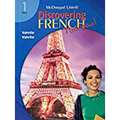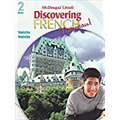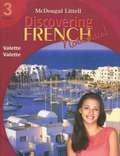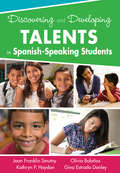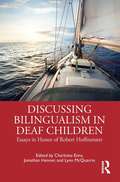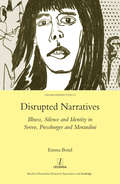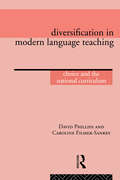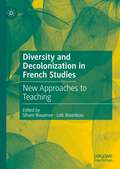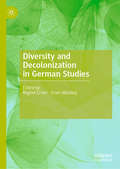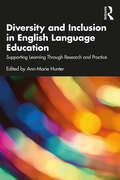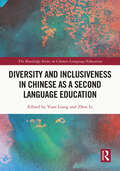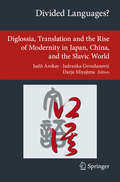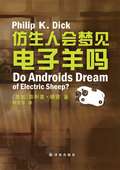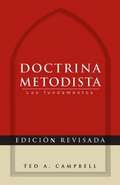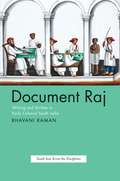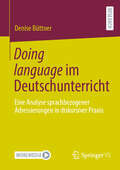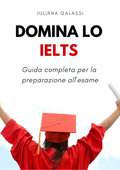- Table View
- List View
Dirty Spanish: Everyday Slang from "What's Up?" to "F*%# Off!" (Dirty Everyday Slang)
by Juan CaballeroLearn how to swear like a native speaker with this highly improper phrasebook! Learn the slang words, modern phrases, and curses they never taught you in Spanish class with this hilariously improper English-Spanish phrasebook. You already know enough Spanish to get by, but you want to be able to tell those inside jokes, greet your friends in a laid-back manner, and casually pick someone up at a bar. From &“What&’s up?&” to &“Wanna go home with me?&” Dirty Spanish will teach you how to speak like you&’re a regular on the streets of Madrid or Mexico City or Buenos Aires. But you&’ll also discover material that goes beyond a traditional phrasebook, including: *Hilarious insults *Provocative facts *Explicit swear words *Themed Spanish cocktails *and more! Next time you&’re traveling to Spain, Mexico, or South America—or just practicing your conversational Spanish—drop the textbook formality, and get dirty!
Dirty Yiddish: Everyday Slang from "What's Up?" to "F*%# Off!" (Dirty Everyday Slang)
by Adrienne GusoffNext time you’re chattin’ with your khaverim (friends) and mishpukheh (family), bust out some Yiddish expressions that’ll liven up the conversation.Nothing is censored in Dirty Yiddish. It includes phrases for any situation, so readers have enough chutzpah (balls) to tell the local deli that they’ve waited long enough for their knish, and explicit swear words crude enough to shock Bubby and everyone else at the Passover seder. There’s even vulgar sex terminology so graphic it puts the outspoken Lower East Side princesses to shame. Bust out with expressions they never teach you in school, including cool slang, funny insults, explicit sex terms, and raw swear words. Dirty Yiddish teaches the casual expressions heard every day on the streets of New York . . . What’s up? Vos makhst du?Crazy bastard! Meshuggeneh momzer!I’m hammered. Ikh bin fershikkert.Don’t fuck with me! Bareh mikh nit!I have the shits. Ikh hob a shittern mogn.Lick my pussy. Lekh meyn lokh.Was it good for you? Tsufreedn?
Discipline-Specific Writing: Theory into practice
by John Flowerdew Tracey CostleyDiscipline-Specific Writing provides an introduction and guide to the teaching of this topic for students and trainee teachers. This book highlights the importance of discipline-specific writing as a critical area of competence for students, and covers both the theory and practice of teaching this crucial topic. With chapters from practitioners and researchers working across a wide range of contexts around the world, Discipline-Specific Writing: Explores teaching strategies in a variety of specific areas including science and technology, social science and business; Discusses curriculum development, course design and assessment, providing a framework for the reader; Analyses the teaching of language features including grammar and vocabulary for academic writing; Demonstrates the use of genre analysis, annotated bibliographies and corpora as tools for teaching; Provides practical suggestions for use in the classroom, questions for discussion and additional activities with each chapter. Discipline-Specific Writing is key reading for students taking courses in English for Specific Purposes, Applied Linguistics, TESOL, TEFL and CELTA.
Discourses of Identity: Language Learning, Teaching, and Reclamation Perspectives in Japan
by Ryuko Kubota Martin Mielick Luke LawrenceThis edited book draws on research on identity in language education to present a detailed and multi-faceted study of identity in language learning, teaching and revitalization settings in the context of Japan. It employs a diverse range of theoretical approaches, including poststructuralism, critical realism, cognitive behavioral theory, and complexity theory,, as well as methodologies such as linguistic ethnography, narrative enquiry, and critical multimodal discourse analysis. The authors focus on multiple dimensions of identity, illuminating linguistic, cultural and human complexity as manifested in language teaching and learning. This book will be of interest to advanced students and scholars of TESOL, applied linguistics, education, Japanese studies, East Asian studies, linguistic anthropology, indigenous languages and sociolinguistics.
Discovering Fiction: An Introduction
by Judith Kay Rosemary GelshenenAdapted short stories enhance pre-intermediate students' reading skills, language learning, and enjoyment of literature. Discovering Fiction, Intro Level, has the same unit and chapter structure as the two higher level books. There are four units, each containing three stories that are related in terms of their theme; extensive prereading and post-reading tasks accompany each story. Unlike the other two books, however, an audio CD containing a reading of each story is packaged into each Student's Book.
Discovering French Today!, French 1A, First part = Première partie
by Jean-Paul Valette Rebecca M. ValetteNIMAC-sourced textbook
Discovering French Today!, French 1B, Second Part = Deuxième partie
by Jean-Paul Valette Rebecca M. ValetteNIMAC-sourced textbook
Discovering and Developing Talents in Spanish-Speaking Students
by Joan F. Smutny Kathryn P. Haydon Olivia G. Bolanos Gina M. Danley¡Atención! Recognize the strengths of Spanish-speaking students! How do you nurture the gifts and talents of the growing population of Hispanic students? This book provides teachers and leaders with the skills needed to uncover each child’s abilities and ultimately boost achievement for gifted Spanish-speaking students. Packed with strategies that teachers can use immediately to enhance instruction and assessment, this book shows how to: Recognize students’ unique strengths Identify and develop the gifts of bilingualism and different cultures Create challenging learning experiences for every student in the class Adapt tools and strategies to meet each learner’s unique needs Connect with parents and the greater Spanish-speaking community
Discussing Bilingualism in Deaf Children: Essays in Honor of Robert Hoffmeister
by Charlotte EnnsThis collection unites expert scholars in a comprehensive survey of critical topics in bilingual deaf education. Drawing on the work of Dr. Robert Hoffmeister, chapters explore the concept that a strong first language is critical to later learning and literacy development. In thought-provoking essays, authors discuss the theoretical underpinnings of bilingual deaf education, teaching strategies for deaf students, and the unique challenges of signed language assessment. Essential for anyone looking to expand their understanding of bilingualism and deafness, this volume reflects Dr. Hoffmeister’s impact on the field while demonstrating the ultimate resilience of human language and literacy systems.
Disrupted Narratives: Illness, Silence and Identity in Svevo, Pressburger and Morandini
by Emma BondIf Madame Bovary's death in Flaubert's 1857 novel marked the definitive end of the Romantic vision of literary disease, then the advent of psychoanalysis less than half a century later heralded an entirely new set of implications for literature dealing with illness. The theorization of a potential unconscious double (capable of expressing the body, and thus also the intimate damage caused by disease) in turn suggested a capacity to subvert or destabilize the text, exposing the main thread of the narrative to be unreliable or self-conscious. Indeed, the authors examined in this study (Italo Svevo (1861-1928), Giorgio Pressburger (1937-) and Giuliana Morandini (1938-)) all make use of individual 'infected' or suppressed voices within their texts which unfold through illness to cast doubt on a more (conventionally) dominant narrative standpoint. Applying the theories of Freud and more recent writings by Julia Kristeva, Bond offers a new critical reading of the literary function of illness, a function related to the very nature of narration itself.
Diversification in Modern Language Teaching: Choice and the National Curriculum
by David Phillips Caroline Filmer-SankeyAs the effects of European integration become more widely felt the effective teaching of modern languages is moving towards the centre of the educational agenda and more and more schools are considering starting pupils on a first foreign language other than French - a development encouraged by the National Curriculum orders in Modern Languages. Diversification in Modern Language Teaching gives language teachers and heads of department the evidence upon which to decide if diversification is right for them. It looks at the factors which effect children's learning in this area and at the managerial issues both within and outside the school. Throughout it argues that the decision must be a purely educational one, based on pupil motivation and accessibility as well as on particular local strengths among staff and parents.
Diversity and Decolonization in French Studies: New Approaches to Teaching
by Loïc Bourdeau Siham BouamerThis edited volume presents new and original approaches to teaching the French foreign-language curriculum, reconceptualizing the French classroom through a more inclusive lens. The volume engages with a broad range of scholars to facilitate an understanding of the process of French (de)colonization as well as its reverberations into the postcolonial era, and a deeper engagement with the global interconnectedness of these processes. Chapters in Part I revist the concept of the "francophonie," decenter the field from “metropolitan” or “hexagonal” and white France and underline how current teaching materials reproduce epistemic and colonial violence. Part II adopts an intersectional approach to address topics of gender inclusivity, trans-affirming teaching, queer materials, and ableism. Finally, Part III presents new ways to transform the discipline by affirming our commitment to social justice and making sure that our classrooms are representative of our students’ enriching diversity.
Diversity and Decolonization in German Studies
by Regine Criser Ervin MalakajThis book presents an approach to transform German Studies by augmenting its core values with a social justice mission rooted in Cultural Studies. German Studies is approaching a pivotal moment. On the one hand, the discipline is shrinking as programs face budget cuts. This enrollment decline is immediately tied to the effects following a debilitating scrutiny the discipline has received as a result of its perceived worth in light of local, regional, and national pressures to articulate the value of the humanities in the language of student professionalization. On the other hand, German Studies struggles to articulate how the study of cultural, social, and political developments in the German-speaking world can serve increasingly heterogeneous student learners. This book addresses this tension through questions of access to German Studies as they relate to student outreach and program advocacy alongside pedagogical models.
Diversity and Inclusion in English Language Education: Supporting Learning Through Research and Practice
by Ann-Marie HunterThis edited volume takes an expansive, no-nonsense view of the spectrum of English language learners to address their varied backgrounds and their wide range of needs, worries, motivations, and abilities. Each chapter addresses a key area and group of students to enable English language teachers to come away with the knowledge and skills they need to support their students. The contributors, who represent a diverse range of voices themselves, cover essential topics, including dyslexia, neurodiversity, linguistic inclusion, deaf students, LGBTQI+ students, racial and cultural inclusion, and more. Accessible and grounded in cutting-edge research, this book features key concepts, methodologies, and strategies that will encourage reflection and inclusive pedagogy. An invaluable resource for students, researchers, and professionals, this volume demonstrates how English language education can be a force for transformative change and social inclusion.
Diversity and Inclusiveness in Chinese as a Second Language Education (The Routledge Series on Chinese Language Education)
by Zhen LiThis edited volume represents a collaborative effort from over 20 authors worldwide, who generously shared their expertise and insights on diversity and inclusiveness in Chinese as a Second Language (CSL) education. It critically examines a wide range of acquisitional, curricular, and pedagogical issues related to inclusive practices in diverse CSL educational settings across various geographical contexts, including mainland China, Hong Kong, Taiwan, Singapore, Vietnam, the United Kingdom, and Australia. It focuses on students with varied linguistic, ethnic, and cultural backgrounds and learning abilities, drawing on a comprehensive collection of original empirical studies.The book is structured into two parts. Part I addresses research on linguistic and learner diversity in CSL education by exploring the challenges faced by different types of CSL learners, acquisition strategies, and assessment methods. Part II delves into the practical implementation of inclusivity in curriculum design and pedagogical practices across diverse CSL teaching contexts.The book offers a research-informed understanding of diversity in CSL education, promoting inclusive teaching practices and methods to effectively engage learners of all backgrounds. CSL practitioners, educators, leaders, curriculum designers, and researchers will find this book to be a useful resource for supporting their research and practice.
Divided Languages?
by Judit Árokay Jadranka Gvozdanović Darja MiyajimaThe present volume is a collection of papers presented at the international conference "Linguistic Awareness and Dissolution of Diglossia" held in July 2011 at Heidelberg University. The aim is to reevaluate and compare the processes of dissolution of diglossia in East Asian and in European languages, especially in Japanese, Chinese and in Slavic languages in the framework of the asymmetries in the emergence of modern written languages. Specialists from China, Japan, Great Britain, Germany and the U. S. contributed to the volume by introducing their research focusing on aspects of the dissolution of diglossic situations and the role of translation in the process. The first group of texts focuses on the linguistic concept of diglossia and the different processes of its dissolution, while the second investigates the perception of linguistic varieties in historical and transcultural perspectives. The third and final group analyses the changing cultural role and function of translations and their effect on newly developing literary languages.
Do Androids Dream of Electric Sheep? (Mandarin Edition)
by Philip K. DickA Simon & Schuster eBook. Simon & Schuster has a great book for every reader.
Doctrina Metodista: Los fundamentos
by Ted A. CampbellJohn Wesley distinguished between essential doctrines on which agreement or consensus is critical and opinions about theology or church practices on which disagreement must be allowed. Though today few people join churches based on doctrinal commitments, once a person has joined a church it becomes important to know the historic teachings of that church's tradition. In Methodist Doctrine: The Essentials, Ted Campbell outlines historical doctrinal consensus in American Episcopal Methodist Churches in a comparative and ecumenical dialogue with the doctrinal inheritance of other major families of Christian tradition. In this way, the book shows both what Methodist churches historically teach in common with ecumenical Christianity and what is distinctive about the Methodist tradition in its various contemporary forms. Documents examined include The Twenty-Five Articles of Religion, The General Rules, Wesley's Standard Sermons and Explanatory Notes upon the New Testament, The Methodist Social Creed, and the Apostles' Creed.
Document Raj: Writing and Scribes in Early Colonial South India
by Bhavani RamanHistorians of British colonial rule in India have noted both the place of military might and the imposition of new cultural categories in the making of Empire, but Bhavani Raman, in "Document Raj," uncovers a lesser-known story of power: the power of bureaucracy. Drawing on extensive archival research in the files of the East India CompanyOCOs administrative offices in Madras, she tells the story of a bureaucracy gone awry in a fever of documentation practices that grew ever more abstractOCoand the power, both economic and cultural, this created. aIn order to assert its legitimacy and value within the British Empire, the East India Company was diligent about record keeping. Raman shows, however, that the sheer volume of their document production allowed colonial managers to subtly but substantively manipulate records for their own ends, increasingly drawing the real and the recorded further apart. While this administrative sleight of hand increased the companyOCOs reach and power within the Empire, it also bolstered profoundly new orientations to language, writing, memory, and pedagogy for the officers and Indian subordinates involved. Immersed in a subterranean world of delinquent scribes, translators, village accountants, and entrepreneurial fixers, "Document Raj" maps the shifting boundaries of the legible and illegible, the legal and illegitimate, that would usher India into the modern world.
Doing language im Deutschunterricht: Eine Analyse sprachbezogener Adressierungen in diskursiver Praxis
by Denise BüttnerDie Studie leistet einen empirisch-rekonstruktiven Beitrag zu einer machtkritisch ausgerichteten Fachdidaktik. Sie fokussiert den Deutschunterricht und die darin stattfindenden Interaktionen als diskursive Praxis, in der ein spezifisches Wissen in, über und angesichts von Sprache relevant gemacht wird. Für Subjektivierung ist jenes Wissen hochgradig wirkmächtig und bleibt den Akteur*innen im Prozess der schulischen Enkulturation doch größtenteils unbewusst. Darin liegt ein hohes Potential für die institutionelle (Re-)Produktion von Linguizismus.Vor diesem Hintergrund eröffnet die Studie einen Blick auf sprachbezogene Adressierungen, die in charakteristischer Weise vom Fach selbst ausgehen. Sie werden in (fach)didaktischen und pädagogischen Programmatiken breit kommuniziert und zeichnen sich bis auf die Ebene unterrichtlicher Praktiken ab. Um das Zusammenspiel von fachspezifischer Adressierung und Praktiken des ‚doing language‘ möglichst eng aufeinander beziehen und in rekonstruktionslogisch plausibilisierte Zusammenhänge bringen zu können, liegt der Arbeit ein wissenssoziologisch-diskursanalytischer Ansatz zugrunde.
Domina lo IELTS: Guida completa per la preparazione all'esame
by Juliana GalassiHai bisogno di superare lo IELTS per conquistare il tuo posto nello scambio e non sai da dove iniziare? Con la guida Domina lo IELTS imparerai un metodo pratico ed efficace per prepararti all'esame, senza che la tua routine ne risenta. Non importa se hai poco tempo per prepararti all'esame o se il tuo inglese non è avanzato. Grazie a questa guida potrai sapere tutto ciò che c'è da sapere riguardo all'esame, conoscerai il giusto modo per prepararsi, comprenderai il tuo reale livello d'inglese ed avrai accesso a diversi materiali gratuiti da integrare ai tuoi studi. Oltre a tutto ciò, imparerai ad organizzare un programma di studi che si adatti alla tua routine, comprenderai anche i principali errori che i candidati commettono e saprai come evitarli. Avrai accesso ad oltre 70 simulazioni d'esame. Accedi all'e-Book Domina lo IELTS e conquista il voto di cui hai bisogno nell'esame!
